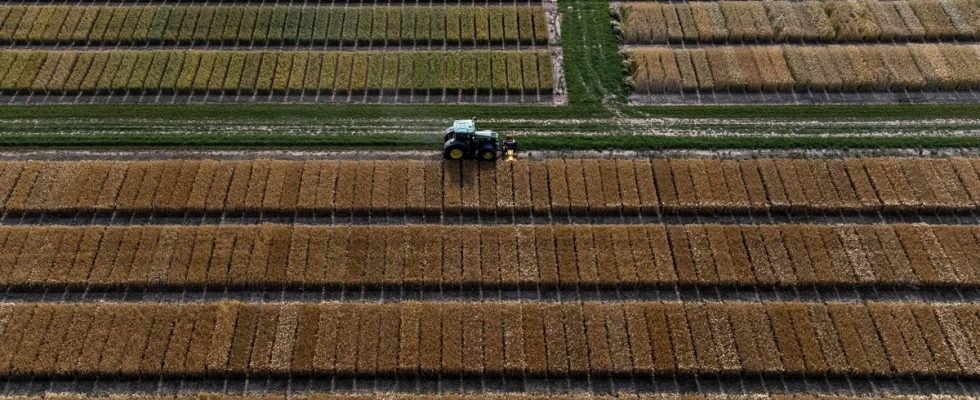In Brussels, the European Commission proposed to relax the rules governing GMOs to encourage the use of NGT (New genomic techniques or new genomic techniques), DNA modifications intended to make it possible to create more resistant and durable seeds. . Faced with this announcement, many voices in the ecological sphere castigated this announcement and called it “hidden GMOs”. Back to this ad that questions.
What is an NGT?
NGTs are a genetic modification of seeds. But unlike traditional GMOs, these new techniques no longer require transgenesis, the act of transferring the gene from one species to another. No, now scientists can directly modify DNA thanks to new technologies.
“Innovation is inseparable from sustainable development: we want to give farmers the tools to produce healthy and safe food, adapted to changing climatic conditions”, guaranteeing “food security” and competitiveness, justified on Wednesday the European Commissioner for Health, Stella Kyriakides.
Varieties requiring fewer pesticides, more resistant to drought or disease, wheat low in gluten… so many horizons opened up according to Brussels by “new genomic techniques” (NGT), a host of tools “editing” the genetic material of plants without external addition – unlike “transgenic” genetically modified organisms (GMOs) introducing a gene from a different species. For Brussels, these emerging technologies could develop crops adapted to the climate and more productive, or foods with fewer allergens.
Why does Brussels want to change the texts?
Today, the rules governing GMOs (long authorization procedure, traceability, labelling, monitoring, etc.), dating back more than ten or even twenty years sometimes, appear “unsuitable”, considers the Commission, which proposes to no longer apply them. to seeds and products derived from NGT and presenting modifications likely to occur naturally or via traditional crosses.
Subject to a limited number of mutations, they would be considered “equivalent” to conventional varieties and registered in a public database, with the obligation of specific labeling only for seeds. Herbicide-resistant varieties could also be affected. However, no NGT product could be labeled “organic”, according to this proposal which will be discussed by the States and MEPs.
All other NGT varieties, deemed not equivalent to conventional, would remain subject to the regime governing GMOs, with adjustments. The obligation to provide a detection method for each seed created could be waived. The EU lists 90 authorization requests for NGT crops at the research stage, with only a few field tests (maize in Belgium, potatoes in Sweden, etc.). “Less bitter” mustard greens are already marketed in the United States and browning-resistant bananas approved in the Philippines.
What are the opponents of this regulatory relaxation saying?
The simplification of the rules was demanded by the powerful agricultural organization Copa-Cogeca and some of the Member States which intend to negotiate the NGT legislation together with another text imposing pesticide reduction targets, on which discussions are bogged down.
Conversely, environmental NGOs and left-wing MEPs are calling for NGTs to remain subject to GMO regulations in accordance with the 2018 verdict of the EU Court of Justice. “We must not play sorcerer’s apprentice, cultivate without complete and independent evaluation, without traceability, or consumer information”, insists the elected socialist Christophe Clergeau, underlining the complex interactions of a plant with its environment, in particular the pollinators.
For Ifoam (federation of organic agriculture), Brussels “sacrifices the precautionary principle” in favor of “a massive accelerator of the lucrative business model of the biotech industry”. His concern is to see organic destabilized by the risks of contamination and reduced traceability requirements.
For its detractors, gene editing is far from proven. “It’s a smokescreen to avoid the debate on the sustainable agricultural transition. These ”new GMOs” remain a mirage which we are not certain will materialize”, judged Mute Schimpf, from Friends of the Earth. The NGO instead advocates “maximizing diversity” by adapting varieties locally.
“The release of new GMOs will further impoverish agricultural biodiversity and soil health, essential for guaranteeing food security, by encouraging monocultures and genetic uniformity”, abounds Francesco Sottile, of Slow Food.
Another sensitive point is the lack of labeling on foods marketed from NGT plants: the Foodwatch association denounces a “tremendous decline […] which would deprive consumers of their right to know what is on their plate”.

